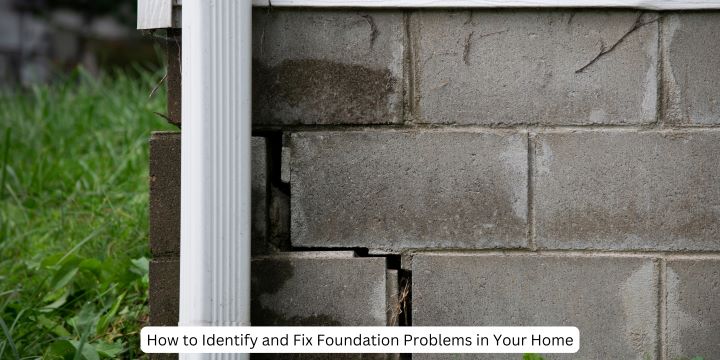Table of Contents
- Signs of Foundation Problems
- Causes of Foundation Issues
- Common Foundation Repair Methods
- Importance of Timely Repairs
- Preventive Measures
- Choosing a Reliable Contractor
- Frequently Asked Questions
Signs of Foundation Problems
Issues with the foundation can appear in different forms, like wall cracks, uneven floors, and doors not closing correctly. These indicators can initially be subtle but tend to worsen if not addressed. Foundation repair Dallas often addresses these common signs of underlying issues, such as minor wall cracks turning into more pronounced gaps or door frames that become increasingly misaligned. Recognizing these signs early can save you from costly repairs. It’s crucial to be vigilant about these symptoms to maintain the structural integrity of your home. Frequent evaluations can assist in identifying issues at an early stage before they escalate. For instance, periodic checks of your basement and exterior walls can reveal early-moving cracks that otherwise might go unnoticed.
Causes of Foundation Issues
Several factors can lead to foundation problems, including soil conditions, water issues, and construction practices. For instance, expansive clay soil can swell and shrink, causing movement beneath the foundation. Such soil types are common in various regions and pose a significant challenge to homeowners. Sudden heavy rainfall or prolonged drought can exacerbate this expansion and contraction, leading to substantial foundation shifts. Identifying the source of the problem is essential for successful fixes. Other contributing factors include poor drainage around the home and inadequate site preparation before construction, which can result in soil erosion and instability. Plumbing leaks under a slab foundation can also erode soil, leading to subsidence and cracking over time. Moreover, improperly compacted fill soils used during the construction phase can settle unevenly, causing shifts in the foundation.
Common Foundation Repair Methods
Slab Jacking
This technique raises sunken concrete to its original level using a grout mixture. It’s beneficial for driveways, patios, and other external concrete surfaces. The process involves drilling small holes in the concrete and injecting the grout to fill the voids beneath. Slab jacking is a relatively quick and cost-effective solution but may only be suitable for some foundation issues. It is generally used for structures that have settled due to compacted fill dirt. This repair can usually be finished in a day, reducing interruptions to your daily routine.
Piling
Poles are inserted into the ground through driving or drilling to support the foundation. Different piling methods exist, including steel, concrete, and helical piers. Steel piers are durable and suitable for heavy structures, while concrete piers offer a cost-effective solution for homes. Helical piers have flexibility and can be utilized in different types of soil. This method provides a stable base for the structure, which is particularly beneficial for homes built on unstable soil. Piling is a more permanent solution but can be expensive and require significant preparation before installation. The process involves:
- Assessing soil conditions.
- Precise placement of piers.
- Sometimes, a steel reinforcement cage is installed for added stability.
Wall Anchors
Wall anchors stabilize bowing basement walls. They involve installing metal plates inside the wall and connecting them to exterior anchors in the soil with steel rods. This method helps prevent further bowing and is generally less invasive than other repair techniques. Wall anchors provide a long-term fix by counteracting the pressure exerted by hydrostatic forces on the basement walls. The installation typically requires minimal disturbance to landscaping and can be adjusted periodically to ensure continued stability.
Importance of Timely Repairs
Addressing foundation issues promptly prevents further damage. Disregarding the indicators may result in more severe issues, significantly causing repair expenses to rise. For example, a small unchecked crack can expand and compromise the entire foundation’s stability, leading to extensive damage. Timely intervention can also prevent secondary issues such as water damage, pest infestations, and compromised structural integrity. Additionally, a stable foundation contributes to your home’s overall safety and value, providing homeowners peace of mind. A residence with a solid, well-maintained foundation can fetch a higher resale value and minimize insurance claims for structural damage. Furthermore, timely repairs can help maintain the interior comfort of your home by preventing drafts, uneven floors, and other issues associated with a compromised structure.
Preventive Measures
Maintaining proper drainage, monitoring soil moisture, and scheduling regular inspections can help prevent foundation issues. Simple steps like these can safeguard your home’s foundation. For example, ensuring that gutters and downspouts direct water away from the house can significantly reduce the risk of soil expansion and contraction. Setting up an effective drainage system around your home can help avoid water pooling close to the foundation, often leading to soil shifting. Frequently monitoring the soil’s moisture levels near your foundation can also assist in taking timely preventive actions.
Moreover, professional inspections and assessments can catch potential issues before they become serious. Additionally, installing a moisture barrier along the foundation can help control humidity and reduce soil erosion. Seasonal adjustments, such as drying the soil around the foundation during the wet season and adding moisture in the dry season, can help maintain soil stability.
Choosing a Reliable Contractor
Look for experienced contractors with positive reviews. Verify their credentials and ensure they use quality materials for repairs. Reliable contractors provide warranties for their work, ensuring homeowners’ peace of mind. Getting multiple quotes and asking for references is essential to ensure you’re hiring the best professional for the job. Checking for certifications from recognized industry bodies can also guarantee that the contractor adheres to high standards of quality and professionalism. Ask about the specific methods and materials they plan to use for your foundation repair, as this information can indicate their level of expertise. A competent contractor will provide a comprehensive evaluation and explain the pros and cons of various repair options, ensuring you make an informed decision. Furthermore, they should be transparent about the project timeline, costs, and possible disruptions, helping you plan accordingly.
Frequently Asked Questions
Q: What are common signs of foundation problems?
A: Cracks in walls, uneven floors, and sticking doors are common signs. These might be accompanied by diagonal cracks in corners, separating moldings, and gaps around window frames. These symptoms can sometimes be mistaken for minor settling issues, but they often indicate more profound problems with the foundation that need attention.
Q: What causes foundation issues?
A: Soil conditions, water damage, and construction errors are typical causes. Unexpected large tree roots growing near the foundation or seismic activity can also be contributing factors. Other less common but significant causes include the type of construction materials used and changes in the ground structure due to nearby construction or natural disasters.
Q: How can I prevent foundation problems?
A: Proper drainage, soil moisture control, and regular inspections are essential preventive measures. Additionally, planting trees and large shrubs away from your home can prevent root systems from disturbing the foundation. Investing in quality plumbing that is regularly checked for leaks can mitigate water-related foundation issues. Maintaining a well-balanced landscape grading away from the foundation ensures that water does not pool around the structure, which helps avoid moisture-related soil movement. Inspecting and maintaining internal and external water control systems can also be a proactive step in foundation maintenance.







